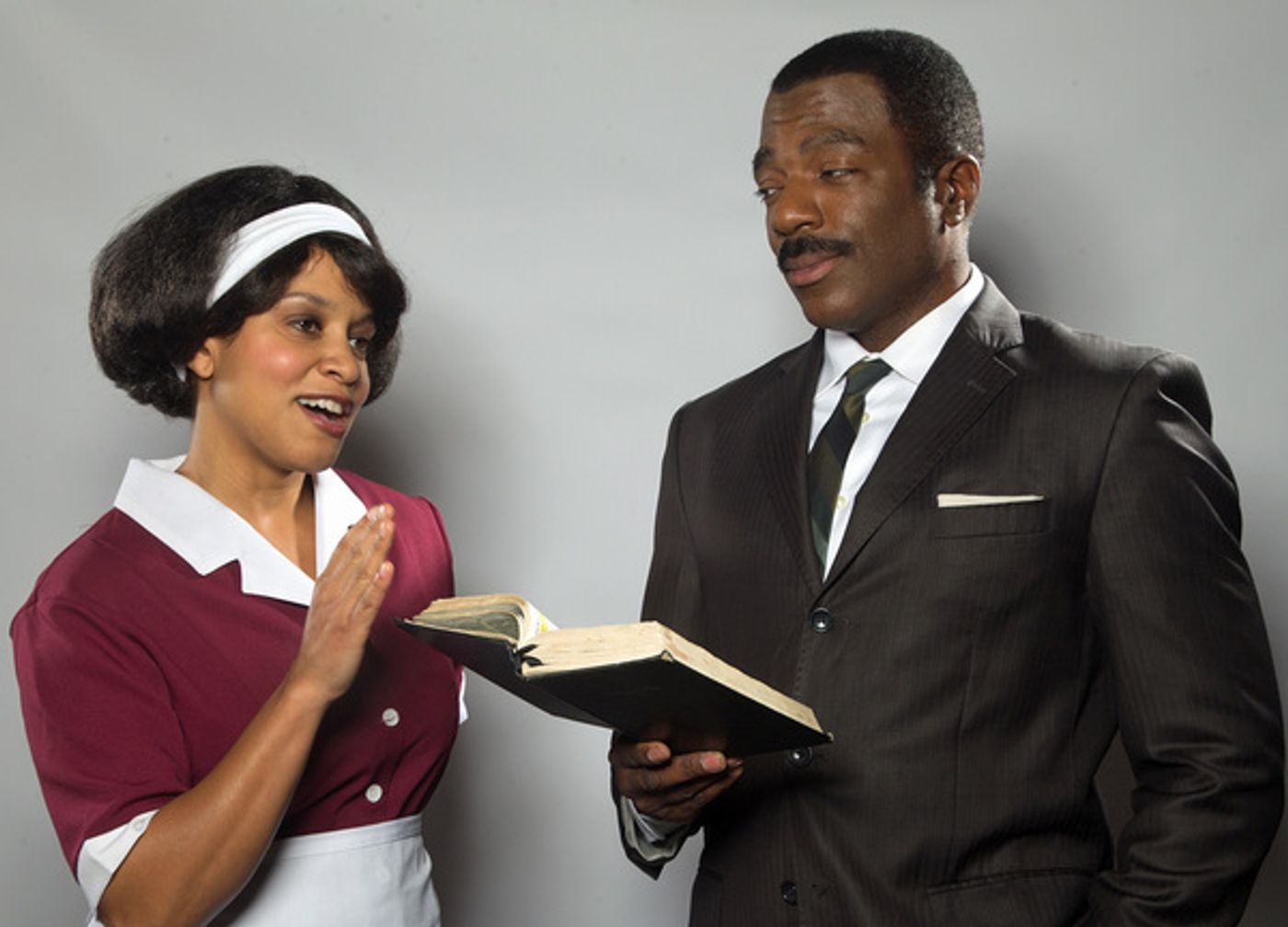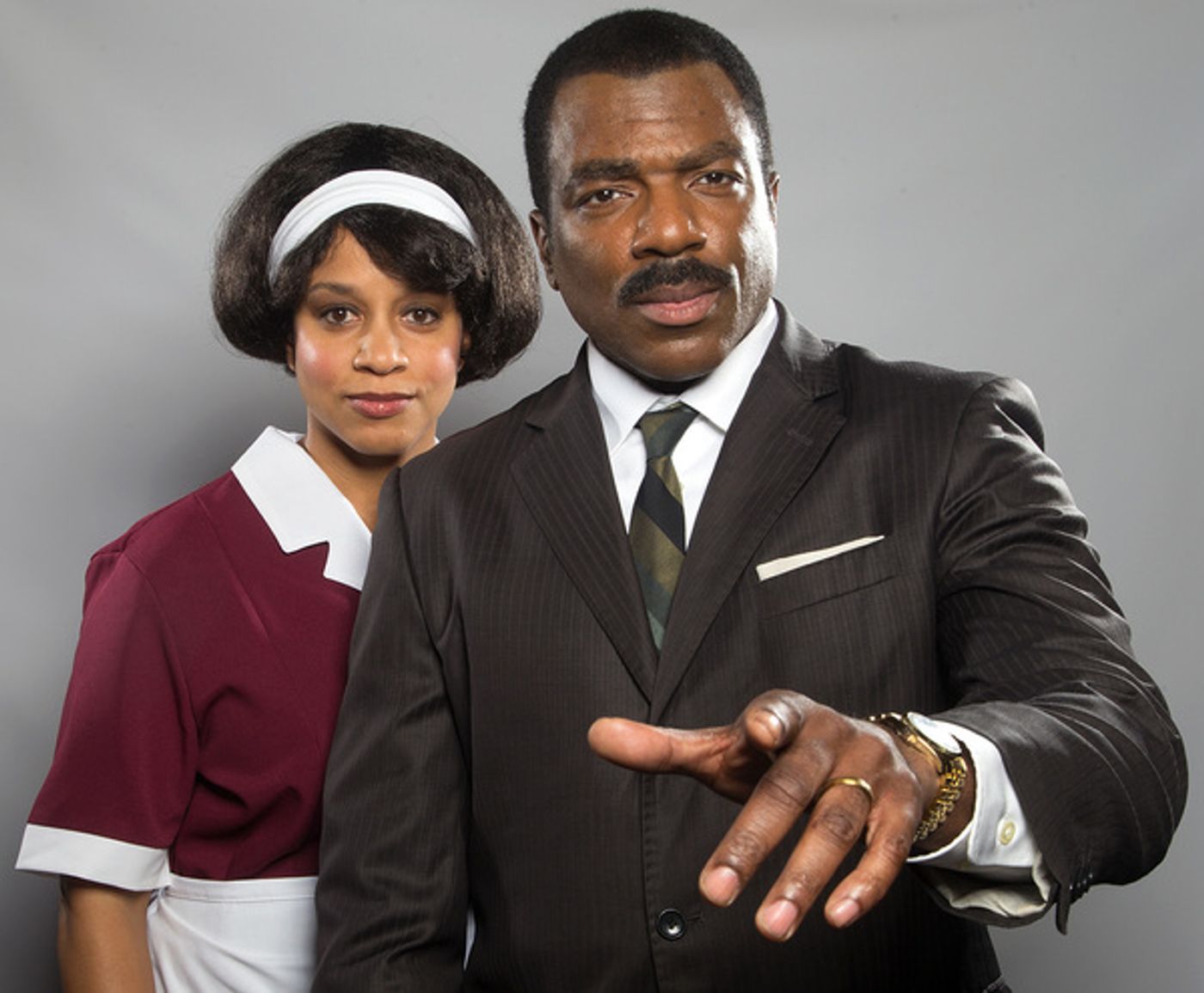Photo Flash: First Look At The Cast of THE MOUNTAINTOP At Garry Marshall Theatre
Garry Marshall Theatre presents the West End and Broadway play The Mountaintop by Katori Hall. The Mountaintop is directed by Gregg T. Daniel, who recently staged A Raisin in the Sun at A Noise Within (Ovation Award nomination for Best Director) and Her Portmanteau at Boston Court.
The cast features Gilbert Glenn Brown (national tour The Mountaintop, and on film in the upcoming Best of Enemies) and Carolyn Ratteray (Geffen Playhouse The Cake, A Noise Within The Imaginary Invalid). Garry Marshall Theatre's Artistic Directors are Joseph Leo Bwarie and Dimitri Toscas.
The Mountaintop will be presented in 20 performances only, on February 6 to March 10 (press opening February 8). Tickets are now on sale by visiting garrymarshalltheatre.orgor by calling 818-955-8101.
The Mountaintop takes place on the night of April 3, 1968. Dr. Martin Luther King, Jr. has just given one of his most impassioned and famous speeches to support sanitation workers during an intense strike in Memphis. Known as his "I've Been to the Mountaintop" speech, he spoke as if he knew what might happen the next day.
Dr. King said, "We've got some difficult days ahead. But it really doesn't matter with me now, because I've been to the mountaintop. And I don't mind. Like anybody, I would like to live - a long life; longevity has its place. But I'm not concerned about that now. I just want to do God's will. And He's allowed me to go up to the mountain ... I've seen the Promised Land. I may not get there with you. But I want you to know tonight, that we, as a people, will get to the Promised Land. I'm not worried about anything. Mine eyes have seen the glory of the coming of the Lord."
It is a dark night, and lighting and thunder crack the sky. Room 306, the Lorraine Motel. Tonight, it is just another stopover motel for Dr. King. Tomorrow, it becomes the scene of one of our nation's greatest losses.
Water stains pockmark the walls. Bright orange and fading brown sixties décor accent the room. The carpet is the color of bile. Dr. King, tired and hungry, wants cigarettes and coffee. But mostly he is weary.
Marshall Artistic Director Dimitri Toscas said, "The Mountaintop is full of vivid theatricality, poetic language, and surprising twists. This is a drama full of comedy and magic realism that takes us to the summit of a man's historic life and offers a stunning new view of his dream for our nation."
Linda Winer in Newsday said The Mountaintop "crackles with theatricality and a humanity more moving than sainthood."
Marilyn Stasio said in Variety, "Set in Memphis on the eve of his assassination, this soul-stirring drama finds King confiding his doubts, fears and morbid premonitions to a sassy motel maid [named Camae] - a deceptively trite situation that Hall transforms into an emotionally powerful and theatrically stunning moment of truth.
"This is no ordinary night. This night King walks into his own Garden of Gethsemane and falls on his knees to face his terror and despair, to confess his fears and doubts about his mission, and to pray for the strength to accept his martyrdom. But throughout King's long night of existential darkness, one young playwright has seen to it that he is not alone."
Soyica Diggs Colbert, Professor, Department of African American Studies and Theatre & Performance Studies at Georgetown University, said, "Hall's work engages a tradition of black writing that reimagines historical figures in order to craft revisionary and recuperative narratives and to give voice to histories that may otherwise be forgotten."
At one point Camae remarks to Dr. King, "You have the biggest heart I done ever knownt. You have the strength to love those who could never love you back. If I had just one small fraction of the love you have for this world, then maybe, just maybe, I could become half of what you are."
In her forward to the published version of The Mountaintop, Faedra Chatard Carpenter, University of Maryland Theatre, Dance and Performance Studies faculty, said, "The radical weapon that King champions in The Mountaintop is a love that is all-encompassing and therefore truly revolutionary - the love that emboldens him with the greatest promise while demanding of him the greatest sacrifice."
Toscas said, "The brilliance in Katori Hall's language is her ability to capture, not only the humanity behind the legend, but the love that Dr. Martin Luther King, Jr. had for the world at large. Somehow Hall's language in The Mountaintop turns Dr. King's love into a baton that is passed from one generation to the next, until it firmly lands in our own hand and we are called to pass that love to the next generation. Each of us becomes a point of light in this continuing history."
In his speech Dr. King said, "Somewhere I read that the greatness of America is the right to protest for rights. And so just as I said, we aren't going to let dogs or water hoses turn us around. We aren't going to let any injunction turn us around. We are going on."
Playwright Katori Hall said, "You cut me, and I'll probably bleed barbeque sauce. I am Memphis through and through: home of the blues, FedEx, Elvis Presley, Rendezvous Barbeque and hoodoo." Her Mother, nicknamed Camae, lived a block from the Lorraine Hotel and was 15 years old in 1968. Her Grandmother, fearing violence, did not let her daughter attend the speech.
Hall's award-winning play Hoodoo Love premiered at the Cherry Lane Theatre in 2007. It was developed under Lynn Nottage as part of the theatre's 2006 Mentor Project. Hoodoo Love received three AUDELCO nominations (Best Actress, Best Supporting Actress, August Wilson Playwright Award). Her other plays include: Remembrance, Hurt Village, Saturday Night/Sunday Morning, On The Chitlin' Circuit, and Freedom Train (Kennedy Center American College Theater Festival ten minute play national finalist). Her work has been developed and presented at the following venues: The American Repertory Theatre, Kennedy Center, Cherry Lane Theatre, Classical Theatre of Harlem, Schomburg Center, BRICLab, Women's Project, World Financial Center, Lark Play Development Center, New Professional Theatre, The O'Neill, the Juilliard School, Stanford University, and Columbia University. She is the recipient of numerous awards, including the Lecompte du Nouy Prize, North Manhattan Arts Alliance Fellowship, New York State Council on the Arts Commission Grant, New Professional Theatre's Writers' Festival award, Fellowship of Southern Writers' Bryan Family Award in Drama, New York Foundation of the Arts Fellowship in Playwriting and Screenwriting, Royal Court Theatre Residency, and the Lorraine Hansberry Playwriting Award. She has also been a Kennedy Center Playwriting Fellow.
As an actor, her credits include Law & Order: SVU, The President's Puppets (The Public), Growing Up A Slave (American Place Theatre), Incidents In The Life Of A Slave Girl(American Place Theatre), the world premiere of Amerika (Theatre de la Jeune Lune/American Repertory Theatre), Spring Awakening (Moscow Art Theatre School), Ain't Supposed To Die A Natural Death (Classical Theatre of Harlem), Schooled (WOW Café Theatre), and Black Girl (Sande Shurin Theatre). As a journalist, her work has been published in The Boston Globe, Essence, Newsweek, and The Commercial Appeal.
She graduated from Columbia University in 2003 with a major in African-American Studies and Creative Writing. She was awarded top departmental honors from the university's Institute for Research in African-American Studies. In 2005, she graduated from The American Repertory Theatre Institute for Advanced Theatre Training at Harvard University, receiving a Masters of Fine Arts Degree in Acting. She is now a student in the Juilliard School's Lila Acheson Wallace American Playwrights Program. She is a proud member of the Women's Project Playwrights' Lab, the Lark Playwrights' Workshop, and the Dramatists Guild. www.katorihall.com
Photo Credit: Lorenzo Hodges

Carolyn Ratteray (Camae) and Gilbert Glenn Brown (Martin Luther King Jr.)

Carolyn Ratteray (Camae) and Gilbert Glenn Brown (Martin Luther King Jr.)
Videos

